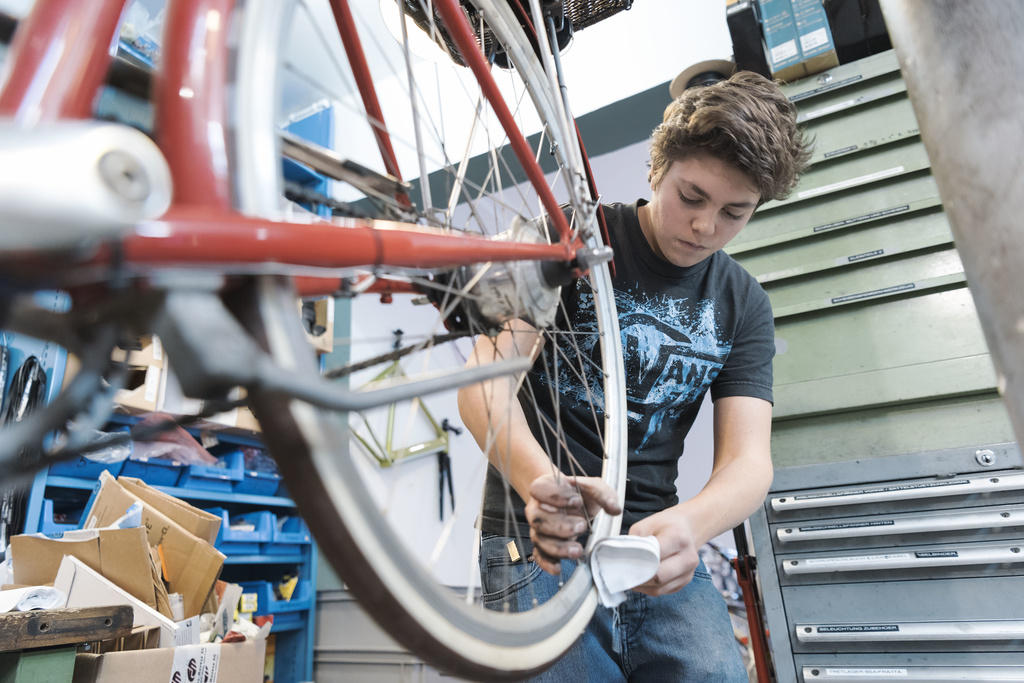
Are 14-year-olds ready to make a career choice?
Students make big decisions about their professional futures at a young age in Switzerland. Too early, or just right? Opinions are increasingly divided.

Swiss adolescents are around 15 or 16 years old when they leave school, but they have to start planning a career path at least two years before that. The final decision comes at age 14, and it can be a difficult process.
Around 20% of students will choose a baccalaureate track (called gymnasium in German, or gymnase in French) which opens the door to university study. At least two-thirds will opt for an apprenticeship in one of more than 250 professions, under Switzerland’s “dual-track” system, which sees them combine vocational school with on-the-job, paid, training.
Several young people told swissinfo.ch that it was difficult to have a clear idea of what you want to do age 14:

More
Choosing a profession when you’re only 14
Russians expatriates in Switzerland said they were used to changing professions more frequently due to economic instability. This is why they tended to prefer flexibility for their children in making career choices, one such parent told swissinfo.ch.
In the United States and United Kingdom, there is more emphasis on going to university and making your career choice then, said parents from those countries. Apprenticeships may be considered less of an option, as they are less well-known at home.
Some Swiss also feel the decision is premature. Nidwalden,External link a small canton in central Switzerland, recently proposed that some of its primary pupils start school a year later (the cut-off date for starting is currently aged six by June 30). Older school leavers would, the canton saidExternal link, be able to “make a more mature decision about their careers”.
Nidwalden’s proposal
In canton Nidwalden, children must have turned six by the end of June to start primary school the following school year. In January, the canton said it wanted to move that date forward to February. This would mean that around a third of children would go to school a year later than they do now, and by default finish a year later.
The canton feltExternal link that there were increasing numbers of young people who were “not mature enough for a decision about their further training or starting an apprenticeship” at the end of their schooling. Being older would be better, it argued.
If accepted, the proposal would come into force in 2020 at the earliest.
The Federation of Swiss Teachers, representing German-speaking Switzerland, is against the moveExternal link, as it goes against efforts to harmonise the country’s 26 cantonal education systems.
Always a challenge
Jürg SchweriExternal link, a professor at the Swiss Federal Institute for Federal Education and TrainingExternal link, points out that choosing a career is always a challenge, whether at age 15 or 25. “We know from research that young people have an idea about what’s going on in the labour market, but that they also feel a lot of uncertainty about what to do,” he said.
Young people aged 14 to 15 are also finding their identities, making it more difficult to decide.
In the end, there are two options, each with its own trade-off, says Schweri. Pupils can stay on at school and delay their career decision, but not experience life outside. Or they can take key decisions early on, learn about the world outside and have the option of changing course later on, which is possible under the Swiss system.
“Apprentices mature earlier than those who only go to school because they have a lot of new experiences and interactions and that helps them to decide about their future career,” Schweri notes.
Parent pressure
“Very often parents have very exact ideas about what their children should do,” says Daniel Reumiller, head of career counselling in Canton BernExternal link, which supports schools in helping students make career choices.
They may pressure their children to attend academic baccalaureate schools. Zurich has just held its famously rigorousExternal link entry exam for its long-cycle baccalaureate school, which starts at age 12. In some parts of the city, especially those with large numbers of professionals and expats, around half a school class might sit the test, one parent said.
The number of young people going to this type of schoolExternal link has increased in Switzerland over the past two decades: from around 86,000 in 2000/1 to almost 110,000 in 2017/8.
+ Half of Swiss to have higher education degrees by 2037
“We try, especially at the ages of 14 or 15, to open children’s minds to show that there are more than 250 professions to choose from, so not just what their parents, peers or even their older brother told them,” says Reumiller, who is also president of the Swiss Conference of Career Guidance ServicesExternal link. Normally parents are invited to the sessions as well, so counsellors can see the family context and ensure good communication.
Gender stereotypes are often an issue as many students don’t like to stand out by choosing what are considered gender-atypical jobs, he said.
+ What boys and girls in Switzerland want to do when they grow up
Permeable system
Reumiller concludes that in general, making a career decision at a younger age works in Switzerland because of the country’s unique education system.
“It’s early, but I don’t think it’s too early. If you ask young people [about their decision] when they have finished their education, most of them say it was a good choice.”
He points out that those struggling with the decision can benefit from so-called “bridging solutions” – taking an extra year at school or a year abroad to learn languages, for example.
In addition, the qualification earned after an apprenticeship is well recognised on the labour market, Schweri says.
Overall, the Swiss system is permeable,External link giving young people a path from apprenticeship to university if they choose to further their studies. Schweri points out that fear of early career decision-making can often be attributed to the fear of having chosen an apprenticeship but wanting to study at university later on.
It’s a little harder to jump sideways, said Reumiller, such as from one type of apprenticeship to another. He suggests the horizontal permeability between professions “could be augmented” in Switzerland but expects it to become easier in the future thanks to initiatives currently underway.
The Swiss are early school leavers
Swiss pupils are generally finished with compulsory schooling earlier than in other countries. Age 15 is given as the official age on OECD statisticsExternal link, compared with 16 in Germany and the UK, for example. In Belgium it’s 18. In Greece, Slovenia and Korea, on the other hand, compulsory school finishes at 14.
Is 14 too young to make a career choice, in your view? How does it work in your country? Let us know in the comments and we’ll use a selection in a follow-up story.

In compliance with the JTI standards
More: SWI swissinfo.ch certified by the Journalism Trust Initiative






























You can find an overview of ongoing debates with our journalists here . Please join us!
If you want to start a conversation about a topic raised in this article or want to report factual errors, email us at english@swissinfo.ch.